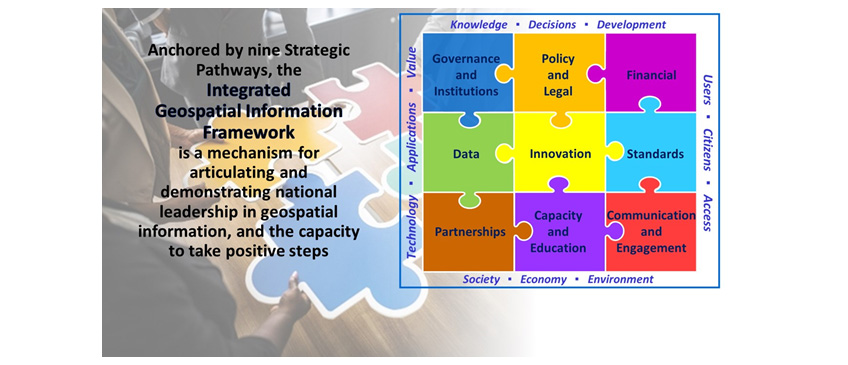Overview
The United Nations Integrated Geospatial Information Framework (UN-IGIF) provides a basis and guide for developing, integrating, strengthening and maximizing geospatial information management and related resources in all countries. It will assist countries in bridging the geospatial digital divide, secure socio-economic prosperity, and to leave no one behind
Documents
UN-IGIF: Strengthening national geospatial information management arrangements
The Committee of Experts on Global Geospatial Information Management at its tenth session adopted the Implementation Guide of the United Nations Integrated Geospatial Information Framework (UN-IGIF), subject to further refinement and finalization, as a means of strengthening national geospatial information management arrangements within and across Member States at the institutional level and supporting the implementation of the Sustainable Development Goals, especially in developing countries. The Committee of Experts noted the global significance of the Framework, which served as a key umbrella for the many activities under its purview, including regional committees and thematic groups, which could be applied to any country to guide transformational change.
UN-IGIF: Global consultation for the Implementation Guide
At its ninth session in August 2019, the Committee of Experts welcomed the development and refinement of the Implementation Guide of the United Nations Integrated Geospatial Information Framework (UN-IGIF) in preparation for subsequent and broader global consultations with Member States and other key stakeholders. The Committee also agreed that the Implementation Guide should be showcased at the Sixth High Level Forum on UN-GGIM, to be held in the United Kingdom of Great Britain and Northern Ireland, in April 2020.
With the continued support of the World Bank, the Regional Committees of UN-GGIM, and other international partners, over the past year the UN-GGIM Secretariat has initiated an ongoing inclusive global engagement and consultative process through expert workshops and meetings to develop the Implementation Guide constructively with inputs from more than 110 countries. This approach has had the benefit of ensuring that, as a methodological framework, the UN-IGIF and the Implementation Guide is truly 'country owned, and country led'.

